10 nov 2015
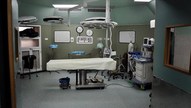
The Palestinian ministry of health said that Turkey would provide the besieged Gaza Strip with a grant of 1.5 million dollars to cover the expenses of fuel used by the government hospitals there.
This came in press remarks made by health minister Jawad Awad following his meeting on Monday with the Turkish consul general in Jerusalem, Mustafa Sarnic, in his office in Ramallah city.
Awad added that the Turkish grant would also be used to cover the urgent medicinal needs of the hospitals.
He asserted that the hospitals would benefit from this Turkish funding as soon as possible in cooperation with the World Health Organization.
The Palestinian official also said that the Turkish side pledged to work on providing further support for the Palestinian health sector as much as it could after receiving a list of vital projects and needs from his ministry.
This came in press remarks made by health minister Jawad Awad following his meeting on Monday with the Turkish consul general in Jerusalem, Mustafa Sarnic, in his office in Ramallah city.
Awad added that the Turkish grant would also be used to cover the urgent medicinal needs of the hospitals.
He asserted that the hospitals would benefit from this Turkish funding as soon as possible in cooperation with the World Health Organization.
The Palestinian official also said that the Turkish side pledged to work on providing further support for the Palestinian health sector as much as it could after receiving a list of vital projects and needs from his ministry.
6 nov 2015

A study released Thursday by the Department of Legal Affairs at the Palestinian Ministry of Justice warned of the serious upshots of Egypt’s flooding of Gaza borders with high-salinity water, dubbing the project a violation of international laws and conventions.
A study conducted by the Justice Ministry found out that Egypt’s pumping of seawater into the borders with the blockaded Gaza Strip leads to the destruction of the aquifer.
According to the study, the move is a flagrant violation of the UN’s resolution on the proper management of trans-boundary aquifers, the peaceful sharing of groundwater resources, and the need among States to cooperate in order to prevent pollution and the destruction of shared aquifers.
Experts, who conducted the study, warned of the menacing repercussions of the destruction of Gaza’s aquifer, saying Egypt’s attempt to protect its borders does not permit it to do harm to Palestinians.
The Justice Ministry called on all concerned parties to immediately step in and stop such a destructive project.
In what observers branded an unprecedented move set to please the Israeli occupation, the Egyptian army forces have begun to pump water from the Mediterranean Sea into underground tunnels on the southern borders of the besieged Gaza Strip since last September.
According to Gaza’s Water Authority, the move poses a serious threat to the Strip’s water and food security.
Blockaded by the Israeli regime since 2007, Gaza used to receive urgently-needed supplies through the network of underground tunnels on its border with Egypt's Sinai Peninsula.
Palestinians in Gaza are living under inhuman conditions due to the tough siege imposed by the Israeli occupation and also due to Egypt’s quasi-permanent closure of the Rafah border crossing.
A study conducted by the Justice Ministry found out that Egypt’s pumping of seawater into the borders with the blockaded Gaza Strip leads to the destruction of the aquifer.
According to the study, the move is a flagrant violation of the UN’s resolution on the proper management of trans-boundary aquifers, the peaceful sharing of groundwater resources, and the need among States to cooperate in order to prevent pollution and the destruction of shared aquifers.
Experts, who conducted the study, warned of the menacing repercussions of the destruction of Gaza’s aquifer, saying Egypt’s attempt to protect its borders does not permit it to do harm to Palestinians.
The Justice Ministry called on all concerned parties to immediately step in and stop such a destructive project.
In what observers branded an unprecedented move set to please the Israeli occupation, the Egyptian army forces have begun to pump water from the Mediterranean Sea into underground tunnels on the southern borders of the besieged Gaza Strip since last September.
According to Gaza’s Water Authority, the move poses a serious threat to the Strip’s water and food security.
Blockaded by the Israeli regime since 2007, Gaza used to receive urgently-needed supplies through the network of underground tunnels on its border with Egypt's Sinai Peninsula.
Palestinians in Gaza are living under inhuman conditions due to the tough siege imposed by the Israeli occupation and also due to Egypt’s quasi-permanent closure of the Rafah border crossing.

Israel has withheld NIS 1.5 billion in Palestinian workers' pension funds.
Kav LaOved, an organisation protecting disempowered workers’ rights in Israel, filed an appeal against the Israeli government, the Population, Borders and Immigration Authority, and the Ministry of Finance for mismanaging Palestinian workers’ pension funds.
The organisation determined that Israel has withheld NIS 1.5 billion ($386,274,940 US) in Palestinian workers’ pension funds.
The Israeli government deducts a set amount from workers’ paychecks for pension plans. Then, when a worker encounters an insurance-qualifying life event, such as disability, old age, or the death of a partner, they can claim pension insurance.
However, Palestinians working in Israel seldom have access to their pension insurance, even though the state deducts money from their paychecks in an identical fashion.
Kav LaOved found this is largely because Israel neglects to inform Palestinians that they even have pension plans. The little information that is provided to Palestinians is not in Arabic, and erroneously reclassifies pension plans as “insurance savings.”
By masking Palestinians’ pension plans as “savings,” Kav LaOved claims the state covertly encourages Palestinians to prematurely withdraw money from their pension plans. Not only does this result in Palestinians paying extremely high taxes on such withdrawals, but they also unknowingly disqualify themselves from claiming pension insurance later on.
The state’s negligence and manipulations have resulted in only one Palestinian receiving pension funds for old age in 2013, three in 2014, and 113 in 2015.
There are approximately 50,000 Palestinians working in Israel.
Kav LaOved also found that the Israeli government has inexplicably canceled basic coverage from Palestinians’ pension plans, such as coverage for disability.
Attorney Michal Tadjer told the AIC that on this matter, no one can explain “when or [why].”
The appeal argues that this haphazard system constitutes “the violation of property and theviolation of equality” and “thus [amounts] to the exploitation of a marginalised,poor workers sector that lacks a voice.”
Kav LaOved insists that the state must provide adequate information about the pension system to Palestinian workers, treat Palestinian workers’ pension funds as pensions, and restore insurance benefits that have been inexplicably canceled.
Kav LaOved, an organisation protecting disempowered workers’ rights in Israel, filed an appeal against the Israeli government, the Population, Borders and Immigration Authority, and the Ministry of Finance for mismanaging Palestinian workers’ pension funds.
The organisation determined that Israel has withheld NIS 1.5 billion ($386,274,940 US) in Palestinian workers’ pension funds.
The Israeli government deducts a set amount from workers’ paychecks for pension plans. Then, when a worker encounters an insurance-qualifying life event, such as disability, old age, or the death of a partner, they can claim pension insurance.
However, Palestinians working in Israel seldom have access to their pension insurance, even though the state deducts money from their paychecks in an identical fashion.
Kav LaOved found this is largely because Israel neglects to inform Palestinians that they even have pension plans. The little information that is provided to Palestinians is not in Arabic, and erroneously reclassifies pension plans as “insurance savings.”
By masking Palestinians’ pension plans as “savings,” Kav LaOved claims the state covertly encourages Palestinians to prematurely withdraw money from their pension plans. Not only does this result in Palestinians paying extremely high taxes on such withdrawals, but they also unknowingly disqualify themselves from claiming pension insurance later on.
The state’s negligence and manipulations have resulted in only one Palestinian receiving pension funds for old age in 2013, three in 2014, and 113 in 2015.
There are approximately 50,000 Palestinians working in Israel.
Kav LaOved also found that the Israeli government has inexplicably canceled basic coverage from Palestinians’ pension plans, such as coverage for disability.
Attorney Michal Tadjer told the AIC that on this matter, no one can explain “when or [why].”
The appeal argues that this haphazard system constitutes “the violation of property and theviolation of equality” and “thus [amounts] to the exploitation of a marginalised,poor workers sector that lacks a voice.”
Kav LaOved insists that the state must provide adequate information about the pension system to Palestinian workers, treat Palestinian workers’ pension funds as pensions, and restore insurance benefits that have been inexplicably canceled.
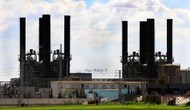
The Palestinian energy and natural resources authority has warned that the Gaza power plant will shut down on Friday evening after Hamdallah’s government stopped exempting the Gaza power station's fuel from taxes.
The authority expressed disappointment over the PA unity government’s decision not to cancel the taxes on Gaza power station's fuel permanently.
"We exerted big efforts over the past days to extend exempting the Gaza power station's fuel from taxes but it was in vain", the authority said in its statement.
Due to the unity government decision, the power plant will shut down on Friday, the statement underline.
The authority appealed to all concerned authorities in Ramallah to facilitate any obstacles for exempting the Gaza power station's fuel from taxes in order to avoid further humanitarian suffering for the population.
For his part, deputy head of the energy authority Fathi Sheikh Khalil said that Prime Minister Rami Hamdallah agreed Thursday evening on exempting the Gaza power station's fuel from taxes.
Hamdallah has earlier recommended the opening of Karem Abu Salem crossing for the fuel entry to Gaza on Friday to prevent the power plant’s shutdown.
For 8 years, the Gaza Strip has been suffering from a massive electricity crisis following Israel's bombing of the only power station in the enclave in mid-2006, thus forcing the population to live according to a daily distribution table including 6 hours of electricity connection and 12 hours of electricity cut.
The authority expressed disappointment over the PA unity government’s decision not to cancel the taxes on Gaza power station's fuel permanently.
"We exerted big efforts over the past days to extend exempting the Gaza power station's fuel from taxes but it was in vain", the authority said in its statement.
Due to the unity government decision, the power plant will shut down on Friday, the statement underline.
The authority appealed to all concerned authorities in Ramallah to facilitate any obstacles for exempting the Gaza power station's fuel from taxes in order to avoid further humanitarian suffering for the population.
For his part, deputy head of the energy authority Fathi Sheikh Khalil said that Prime Minister Rami Hamdallah agreed Thursday evening on exempting the Gaza power station's fuel from taxes.
Hamdallah has earlier recommended the opening of Karem Abu Salem crossing for the fuel entry to Gaza on Friday to prevent the power plant’s shutdown.
For 8 years, the Gaza Strip has been suffering from a massive electricity crisis following Israel's bombing of the only power station in the enclave in mid-2006, thus forcing the population to live according to a daily distribution table including 6 hours of electricity connection and 12 hours of electricity cut.
4 nov 2015
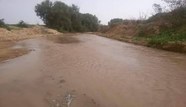
Israeli Occupation Forces (IOF) opened a water dam on Tuesday morning for several hours towards the Palestinian lands in central Gaza Strip despite lack of rain water.
Palestinians of Wadi al-Salqa to the east of Deir al-Balah city said that great damage and financial losses were resulting from flooding of their lands and winter plantings.
Israeli forces opened the same dam along with other dams on Gaza borders last winter causing severe damage to the houses and lands of inhabitants.
Palestinians of Wadi al-Salqa to the east of Deir al-Balah city said that great damage and financial losses were resulting from flooding of their lands and winter plantings.
Israeli forces opened the same dam along with other dams on Gaza borders last winter causing severe damage to the houses and lands of inhabitants.
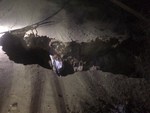
The Egyptian authorities have continued to flood the Gaza-Egypt borders with high-salinity seawater as part of intents to destroy cross-border tunnel activity, resulting in remarkable damage in Gaza’s fauna and flora.
Palestinian security forces and civil defense crews rushed to the scene to protect Palestinian civilians and children from being drowned beneath the high-salinity waters as large pools of seawater stacked one over the other in the area.
Local sources told a PIC journalist that high-salinity sea water has been leaking into the Palestinian side of the border area after the Egyptian authorities stepped up pumping of seawater into Gaza’s borders with Rafah city.
In what observers branded an unprecedented move set to please the Israeli occupation, the Egyptian army forces have begun, since September 11, to pump water from the Mediterranean Sea into underground tunnels on the southern borders of the besieged Gaza Strip, harming nearby civilian homes and cultivated land lots.
According to Gaza Water Authority, the move poses a serious threat to the Strip’s water and food security.
Blockaded by the Israeli regime since 2007, Gaza used to receive urgently-needed supplies through the network of underground tunnels on its border with Egypt's Sinai Peninsula.
Palestinians in Gaza are living under inhuman conditions due to the tough siege imposed by the Israeli occupation and also due to Egypt’s quasi-permanent closure of the Rafah border crossing.
Palestinian security forces and civil defense crews rushed to the scene to protect Palestinian civilians and children from being drowned beneath the high-salinity waters as large pools of seawater stacked one over the other in the area.
Local sources told a PIC journalist that high-salinity sea water has been leaking into the Palestinian side of the border area after the Egyptian authorities stepped up pumping of seawater into Gaza’s borders with Rafah city.
In what observers branded an unprecedented move set to please the Israeli occupation, the Egyptian army forces have begun, since September 11, to pump water from the Mediterranean Sea into underground tunnels on the southern borders of the besieged Gaza Strip, harming nearby civilian homes and cultivated land lots.
According to Gaza Water Authority, the move poses a serious threat to the Strip’s water and food security.
Blockaded by the Israeli regime since 2007, Gaza used to receive urgently-needed supplies through the network of underground tunnels on its border with Egypt's Sinai Peninsula.
Palestinians in Gaza are living under inhuman conditions due to the tough siege imposed by the Israeli occupation and also due to Egypt’s quasi-permanent closure of the Rafah border crossing.
2 nov 2015
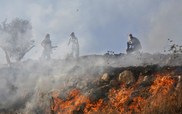
A group of Israeli settlers set fire on Monday to dozens of Palestinian-owned olive tree in Burin town south of Nablus.
Local sources told PIC reporter that nearly 20 Israeli settlers from Yitzhar settlement, illegally built at Palestinian lands, set fire to a Palestinian-owned agricultural field east of the city.
Dozens of olive trees were burned during the settler attack, the sources added.
A week ago, a similar attack has been reported in the same area where a group of settlers stole the olive harvest.
Farmers in the West Bank who depend on Olive season for their livelihood lose about 10 million dollars every year due to Israeli settlers' attacks on them and their olive trees.
Local sources told PIC reporter that nearly 20 Israeli settlers from Yitzhar settlement, illegally built at Palestinian lands, set fire to a Palestinian-owned agricultural field east of the city.
Dozens of olive trees were burned during the settler attack, the sources added.
A week ago, a similar attack has been reported in the same area where a group of settlers stole the olive harvest.
Farmers in the West Bank who depend on Olive season for their livelihood lose about 10 million dollars every year due to Israeli settlers' attacks on them and their olive trees.
31 oct 2015
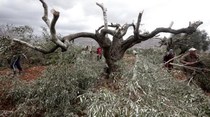
Jewish settlers Saturday stole olive crops of Palestinians in Bourin town to the south of Nablus city in the northern West Bank.
Settlement official in the northern West Bank, Ghassan Daghlas, revealed that dozens of Jewish fanatic settlers from Yitzhar outpost attacked Palestinian farmers and showered them with stones then confiscated their crops of olives. Israeli soldiers who were deployed at the place turned a blind eye to settlers’ offensive practices.
Israeli troops also hindered the arrival of a bus carrying foreign solidarity passengers who volunteered to help Palestinians in picking olives, a key part of the Palestinian economy which Israeli settlers try to cripple by routinely damaging, uprooting, poisoning, or burning down the trees
Accorind to Middle East Eye, $12.3m is lost in Olive income each year in Palestine by damage caused by Israeli settlers.
Settlement official in the northern West Bank, Ghassan Daghlas, revealed that dozens of Jewish fanatic settlers from Yitzhar outpost attacked Palestinian farmers and showered them with stones then confiscated their crops of olives. Israeli soldiers who were deployed at the place turned a blind eye to settlers’ offensive practices.
Israeli troops also hindered the arrival of a bus carrying foreign solidarity passengers who volunteered to help Palestinians in picking olives, a key part of the Palestinian economy which Israeli settlers try to cripple by routinely damaging, uprooting, poisoning, or burning down the trees
Accorind to Middle East Eye, $12.3m is lost in Olive income each year in Palestine by damage caused by Israeli settlers.
30 oct 2015
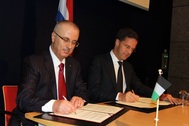
Prime Minister of Netherlands Mark Rutte (R) and Palestinian Prime Minister Rami Hamdallah (L) sign files during the 2nd Dutch-Palestinian Cooperation Forum organised at Bel Air Hotel in Lahey, Netherlands yesterday
The Dutch government is willing to support the natural gas project in the Gaza Strip to provide electricity in the besieged strip, Palestinian unity government Prime Minister Rami Hamdallah announced yesterday.
In a statement on the sidelines of the second Dutch-Palestinian Cooperation Forum held in Amsterdam yesterday, Hamdallah said the Netherlands had agreed to support the natural gas project for a power and water desalination plant in the Gaza Strip.
Zafer Milhem, executive chairman of the Palestinian Electricity Regulatory Council, told an Anadolu correspondent that the unity government is determined to change the power plant in Gaza to allow it to operate on natural gas in the near future rather than industrial fuels.
Milhem had told the Anadolu correspondent earlier that “the plan would take eight months in order to allow the power plant in Gaza to work on natural gas,” explaining that “the plant was originally designed to work on natural gas, but it was adapted to work on industrial fuel over the past few years due to the lack of natural gas at the time.”
Gaza suffers from a severe energy crisis which forces the Gaza electricity company to cut off electricity to some areas and provide it to others. The amount of energy provided by Israel and Egypt does not meet Gaza’s daily energy needs.
Gaza requires 360-370 megawatts of electricity in order to operate 24 hours, but it only receives 210 megawatts, 120 from Israel, 32 from Egypt, and 60 from its own power plant.
The Dutch government is willing to support the natural gas project in the Gaza Strip to provide electricity in the besieged strip, Palestinian unity government Prime Minister Rami Hamdallah announced yesterday.
In a statement on the sidelines of the second Dutch-Palestinian Cooperation Forum held in Amsterdam yesterday, Hamdallah said the Netherlands had agreed to support the natural gas project for a power and water desalination plant in the Gaza Strip.
Zafer Milhem, executive chairman of the Palestinian Electricity Regulatory Council, told an Anadolu correspondent that the unity government is determined to change the power plant in Gaza to allow it to operate on natural gas in the near future rather than industrial fuels.
Milhem had told the Anadolu correspondent earlier that “the plan would take eight months in order to allow the power plant in Gaza to work on natural gas,” explaining that “the plant was originally designed to work on natural gas, but it was adapted to work on industrial fuel over the past few years due to the lack of natural gas at the time.”
Gaza suffers from a severe energy crisis which forces the Gaza electricity company to cut off electricity to some areas and provide it to others. The amount of energy provided by Israel and Egypt does not meet Gaza’s daily energy needs.
Gaza requires 360-370 megawatts of electricity in order to operate 24 hours, but it only receives 210 megawatts, 120 from Israel, 32 from Egypt, and 60 from its own power plant.
29 oct 2015
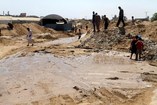
The Palestinian Legislative Council (PLC) on Wednesday slammed the Egyptian waterway project carried out along the borders with the blockaded Gaza Strip, saying it affects both Gaza’s ecosystem and the Palestine-Egypt bilateral ties.
PLC First Deputy Speaker Ahmad Bahar said the waterway project violates Palestinians’ right to live in dignity and in a healthy environment.
He drew attention to the serious damage the channel poses on the underground water and Gaza’s ecosystem, saying Rafah city is at risk of being drowned due to Egypt’s flooding of the borders with high-salinity water.
He added that such a move affects the Palestinian-Egyptian fraternity bonds both on the political and strategic levels, calling on the Egyptian authorities to immediately halt the waterway project and keep to is historic pro-Palestine position.
A report by the PLC further pointed to the serious economic repercussions of the project on Gaza’s fauna and flora, infrastructure, power and water networks, along with sanitation services.
The waterway also affects Gaza’s security by risking to promote chaos and imposing a new fait accompli, in a move set to please the U.S. and the Israeli occupation.
According to the report, the project has a negative impact on the Palestinian national reconciliation and home affairs.
The move also stands in sharp contrast to the international and humanitarian laws, the report added.
The PLC urged the Egyptian authorities to assume their historic, political, and ethical duties vis-à-vis the Palestinian cause.
The PLC further called for an emergency session to be convened by the Arab League to keep tabs on the economic, social, legal, and environmental upshots of the Egyptian project.
The council further urged the human rights organizations and international community to seriously work on halting the project by appealing to local and international courts and mobilizing mass-protest over the project.
The PLC held the Palestinian Authority Chairman, Mahmoud Abbas, ethically and legally responsible for the perilous aftermaths of the project.
In what observers branded an unprecedented move set to please the Israeli occupation, the Egyptian army forces have begun to pump water from the Mediterranean Sea into underground tunnels on the southern borders of the besieged Gaza Strip.
Palestinians in Gaza are living under inhuman conditions due to the tough siege imposed by the Israeli occupation and also due to Egypt’s quasi-permanent closure of the Rafah border crossing.
PLC First Deputy Speaker Ahmad Bahar said the waterway project violates Palestinians’ right to live in dignity and in a healthy environment.
He drew attention to the serious damage the channel poses on the underground water and Gaza’s ecosystem, saying Rafah city is at risk of being drowned due to Egypt’s flooding of the borders with high-salinity water.
He added that such a move affects the Palestinian-Egyptian fraternity bonds both on the political and strategic levels, calling on the Egyptian authorities to immediately halt the waterway project and keep to is historic pro-Palestine position.
A report by the PLC further pointed to the serious economic repercussions of the project on Gaza’s fauna and flora, infrastructure, power and water networks, along with sanitation services.
The waterway also affects Gaza’s security by risking to promote chaos and imposing a new fait accompli, in a move set to please the U.S. and the Israeli occupation.
According to the report, the project has a negative impact on the Palestinian national reconciliation and home affairs.
The move also stands in sharp contrast to the international and humanitarian laws, the report added.
The PLC urged the Egyptian authorities to assume their historic, political, and ethical duties vis-à-vis the Palestinian cause.
The PLC further called for an emergency session to be convened by the Arab League to keep tabs on the economic, social, legal, and environmental upshots of the Egyptian project.
The council further urged the human rights organizations and international community to seriously work on halting the project by appealing to local and international courts and mobilizing mass-protest over the project.
The PLC held the Palestinian Authority Chairman, Mahmoud Abbas, ethically and legally responsible for the perilous aftermaths of the project.
In what observers branded an unprecedented move set to please the Israeli occupation, the Egyptian army forces have begun to pump water from the Mediterranean Sea into underground tunnels on the southern borders of the besieged Gaza Strip.
Palestinians in Gaza are living under inhuman conditions due to the tough siege imposed by the Israeli occupation and also due to Egypt’s quasi-permanent closure of the Rafah border crossing.
24 oct 2015

Extremist Jewish settlers Saturday stormed and torched dozens of dunums of Palestinians’ lands in Bourin town to the south of Nablus city in the northern West Bank.
Eyewitnesses told the PIC reporter that the residents of Bourin town confronted Jewish settlers who torched their agricultural lands leading to spreading of fire to large wide areas.
The eyewitnesses underlined that clashes erupted between Palestinian residents and settlers before Israeli forces reached the place for the protection of fanatic settlers.
The settlers retreated after clashes to Yitzhar settlement and Israeli soldiers fired tear gas canisters at Palestinians.
Eyewitnesses told the PIC reporter that the residents of Bourin town confronted Jewish settlers who torched their agricultural lands leading to spreading of fire to large wide areas.
The eyewitnesses underlined that clashes erupted between Palestinian residents and settlers before Israeli forces reached the place for the protection of fanatic settlers.
The settlers retreated after clashes to Yitzhar settlement and Israeli soldiers fired tear gas canisters at Palestinians.
23 oct 2015
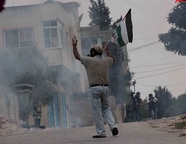
Dozens of Palestinians suffered the effects if tear gas inhalation, Friday, while around fifty trees were burnt, after Israeli soldiers invaded Kufur Qaddoum, in the northern West Bank district of Qalqilia, and assaulted the village's weekly protest.
Coordinator of the Popular Committee against the Wall and Settlements Morad Eshteiwy said that, shortly after the protesters marched from the center of the village, the soldiers started firing rubber-coated steel bullets, and dozens of gas bombs, causing scores of protesters to suffer the effects of tear gas inhalation.
Eshteiwy said that the soldiers also conducted training in Palestinian orchards belonging to the villagers, causing around fifty olive tree to burn.
The army used excessive force against the nonviolent protesters, and tried to prevent them from continuing their procession, an issue that led to clashes with local youths, who hurled stones and empty bottles on army vehicles, and burnt car tires.
Coordinator of the Popular Committee against the Wall and Settlements Morad Eshteiwy said that, shortly after the protesters marched from the center of the village, the soldiers started firing rubber-coated steel bullets, and dozens of gas bombs, causing scores of protesters to suffer the effects of tear gas inhalation.
Eshteiwy said that the soldiers also conducted training in Palestinian orchards belonging to the villagers, causing around fifty olive tree to burn.
The army used excessive force against the nonviolent protesters, and tried to prevent them from continuing their procession, an issue that led to clashes with local youths, who hurled stones and empty bottles on army vehicles, and burnt car tires.
4 oct 2015

The Israeli occupation forces (IOF) at dawn Sunday kidnapped a Palestinian patient from hospital and four other civilians, including three minors, from the West Bank provinces of Nablus and Qalqilya.
Eye-witnesses told a PIC correspondent that an Israeli undercover unit kidnapped the sick Palestinian youth Karam Lutfi Rezq al-Masri while he was undergoing medical check-ups and therapy at the Specialized Arab Hospital, in Nablus.
The same sources added that the Israeli troops claimed they are transferring a casualty to the hospital for urgent treatment, shortly before they kidnapped the patient al-Masri from his own bed.
The IOF further kidnapped the youth Zayd Ziad Amer after they broke into his family home, in Amman Street, and ravaged it.
Zayd’s brother, Ghassan, said remarkable material damage was inflicted on the family home and their cars parked in the area.
The IOF also broke into a series of commercial stores owned by the prisoner Bassam Abu Ghazala, arrested one day earlier, and threw all the stored goods, worth thousands of shekels, outside the stockrooms.
Meanwhile, the Palestinian Prisoners Society said the IOF kidnapped three Palestinian minors from the West Bank province of Qalqilya overnight Saturday.
The group identified the arrestees as 13-year-old Ghazi Jalou, 15-year-old Kamel Harb, and 17-year-old Kamal Udwan after they subjected him to heavy beating.
Eye-witnesses told a PIC correspondent that an Israeli undercover unit kidnapped the sick Palestinian youth Karam Lutfi Rezq al-Masri while he was undergoing medical check-ups and therapy at the Specialized Arab Hospital, in Nablus.
The same sources added that the Israeli troops claimed they are transferring a casualty to the hospital for urgent treatment, shortly before they kidnapped the patient al-Masri from his own bed.
The IOF further kidnapped the youth Zayd Ziad Amer after they broke into his family home, in Amman Street, and ravaged it.
Zayd’s brother, Ghassan, said remarkable material damage was inflicted on the family home and their cars parked in the area.
The IOF also broke into a series of commercial stores owned by the prisoner Bassam Abu Ghazala, arrested one day earlier, and threw all the stored goods, worth thousands of shekels, outside the stockrooms.
Meanwhile, the Palestinian Prisoners Society said the IOF kidnapped three Palestinian minors from the West Bank province of Qalqilya overnight Saturday.
The group identified the arrestees as 13-year-old Ghazi Jalou, 15-year-old Kamel Harb, and 17-year-old Kamal Udwan after they subjected him to heavy beating.
2 oct 2015
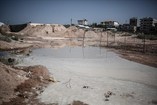
The Egyptian authorities have continued to flood the Gaza-Egypt borders with high-salinity seawater as part of intents to destroy cross-border tunnel activity, resulting in remarkable damage in Gaza’s fauna and flora.
Local sources told a PIC journalist that high-salinity sea water has been leaking into the Palestinian side of the border area after the Egyptian authorities stepped up pumping of seawater into Gaza’s border area in southern Rafah city.
The same sources added that the flooding project resulted in remarkable damage in Gaza’s fauna and flora, with large pools of seawater stacked one day after the other.
In what observers branded an unprecedented move set to please the Israeli occupation, the Egyptian army forces have begun, since September 11, to pump water from the Mediterranean Sea into underground tunnels on the southern borders of the besieged Gaza Strip, harming nearby civilian homes and cultivated land lots.
According to Gaza’s Water Authority, the move poses a serious threat to the Strip’s water and food security.
Blockaded by the Israeli regime since 2007, Gaza used to receive urgently-needed supplies through the network of underground tunnels on its border with Egypt's Sinai Peninsula.
Palestinians in Gaza are living under inhuman conditions due to the tough siege imposed by the Israeli occupation and also due to Egypt’s quasi-permanent closure of the Rafah border-crossing.
Local sources told a PIC journalist that high-salinity sea water has been leaking into the Palestinian side of the border area after the Egyptian authorities stepped up pumping of seawater into Gaza’s border area in southern Rafah city.
The same sources added that the flooding project resulted in remarkable damage in Gaza’s fauna and flora, with large pools of seawater stacked one day after the other.
In what observers branded an unprecedented move set to please the Israeli occupation, the Egyptian army forces have begun, since September 11, to pump water from the Mediterranean Sea into underground tunnels on the southern borders of the besieged Gaza Strip, harming nearby civilian homes and cultivated land lots.
According to Gaza’s Water Authority, the move poses a serious threat to the Strip’s water and food security.
Blockaded by the Israeli regime since 2007, Gaza used to receive urgently-needed supplies through the network of underground tunnels on its border with Egypt's Sinai Peninsula.
Palestinians in Gaza are living under inhuman conditions due to the tough siege imposed by the Israeli occupation and also due to Egypt’s quasi-permanent closure of the Rafah border-crossing.
29 sept 2015
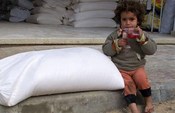
A UN report issued by the World Bank revealed on Tuesday that Palestinians have been getting poorer over the past three years.
The report stated that the decline in aid from donor countries, last year’s war in the Gaza Strip and the Israeli freeze of tax revenues due to the Palestinian Authority during the first trimester of this year have caused severe damage to the Palestinian economy.
According to the report, the Palestinians have been getting poorer over the past three years as a result of the political, security, economic and social conditions imposed on them.
The World Bank report will be presented this week to the Ad Hoc Liaison Committee (AHLC). It recommends reforms to the current general economic trends to halt further deterioration in the economy.
The report pointed out that a quarter of the Palestinians are living under poverty conditions while the unemployment rate in the Gaza Strip exceeded the barrier of 60 per cent. Real GDP per capita has been shrinking since 2013 due to the weak economy in the Palestinian territories, the report added.
The Palestinian Central Bureau of Statistics said that the unemployment rate in the Palestinian territories as a whole is nearly 25 per cent. The UN Conference on Trade and Development (UNCTAD) report, meanwhile, revealed that 72 per cent of Gaza's population suffers from food insecurity.
The report also recommends the Palestinian Authority to make further efforts to improve tax collection and continue to push towards reforms in the health and electricity sectors.
The report stated that the decline in aid from donor countries, last year’s war in the Gaza Strip and the Israeli freeze of tax revenues due to the Palestinian Authority during the first trimester of this year have caused severe damage to the Palestinian economy.
According to the report, the Palestinians have been getting poorer over the past three years as a result of the political, security, economic and social conditions imposed on them.
The World Bank report will be presented this week to the Ad Hoc Liaison Committee (AHLC). It recommends reforms to the current general economic trends to halt further deterioration in the economy.
The report pointed out that a quarter of the Palestinians are living under poverty conditions while the unemployment rate in the Gaza Strip exceeded the barrier of 60 per cent. Real GDP per capita has been shrinking since 2013 due to the weak economy in the Palestinian territories, the report added.
The Palestinian Central Bureau of Statistics said that the unemployment rate in the Palestinian territories as a whole is nearly 25 per cent. The UN Conference on Trade and Development (UNCTAD) report, meanwhile, revealed that 72 per cent of Gaza's population suffers from food insecurity.
The report also recommends the Palestinian Authority to make further efforts to improve tax collection and continue to push towards reforms in the health and electricity sectors.
23 sept 2015
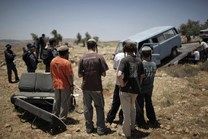
The Israeli settlements sewage water has polluted spring water and plants in the city of Salfit.
Local farmers informed the PIC that the Israeli settlement of Yakir pumped sewage water into Palestinian agricultural lands to the west of Salfit. This water then polluted the plants, and the spring water in the area, they added.
Twenty four Israeli settlements including four factories pour their sewage water in the valley of the city of Salfit while land leveling works in the area is routinely reported for settlement expansion.
In another context, Jewish settlers in Nablus ran over a herd of sheep at dawn Tuesday near Aqraba town to the east of the city.
Shepherd Ayesh Daajnah told the PIC reporter that Jewish settlers in a vehicle ran over his herd of over 300 sheep. 40 sheep at least were crushed and 30 others were injured.
He pointed out that Israeli forces refused to count all the dead sheep, appealing to competent authorities to make up for his loss. He asked for an investigation into the incident.
Extremist Settler Kills 40 Lambs
Local farmers informed the PIC that the Israeli settlement of Yakir pumped sewage water into Palestinian agricultural lands to the west of Salfit. This water then polluted the plants, and the spring water in the area, they added.
Twenty four Israeli settlements including four factories pour their sewage water in the valley of the city of Salfit while land leveling works in the area is routinely reported for settlement expansion.
In another context, Jewish settlers in Nablus ran over a herd of sheep at dawn Tuesday near Aqraba town to the east of the city.
Shepherd Ayesh Daajnah told the PIC reporter that Jewish settlers in a vehicle ran over his herd of over 300 sheep. 40 sheep at least were crushed and 30 others were injured.
He pointed out that Israeli forces refused to count all the dead sheep, appealing to competent authorities to make up for his loss. He asked for an investigation into the incident.
Extremist Settler Kills 40 Lambs

An Israeli settler ran over 40 lambs in the eastern part of the West Bank city of Nablus, on Tuesday evening.
Owner Ayesh al-Da’ajneh said that one of his sons was taking care of the lambs as they were eating in a pasture at the edge of the city.
“The Israeli vehicle approached the lambs and my son raised a light sign in his face thinking the settler had taken the wrong side of the road,” Al-Da’ajneh said, according to Days of Palestine.
He continued: “The settler hit the lambs several times and my son, who was unarmed, could not stop him.”
Forty lambs, out of 300, were killed and at least 20 others were wounded.
Illegal Jewish Israeli settlers and armed forces frequently target Palestinian farmers, killing their sheep and cattle, as well as burning their crops.
Owner Ayesh al-Da’ajneh said that one of his sons was taking care of the lambs as they were eating in a pasture at the edge of the city.
“The Israeli vehicle approached the lambs and my son raised a light sign in his face thinking the settler had taken the wrong side of the road,” Al-Da’ajneh said, according to Days of Palestine.
He continued: “The settler hit the lambs several times and my son, who was unarmed, could not stop him.”
Forty lambs, out of 300, were killed and at least 20 others were wounded.
Illegal Jewish Israeli settlers and armed forces frequently target Palestinian farmers, killing their sheep and cattle, as well as burning their crops.
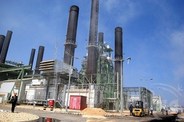
The Energy Authority in Gaza said Tuesday it transferred three million shekels to purchase fuel for the enclave’s power plant.
The Energy Authority raised alarm bells over the ups and downs endured by Gaza’s power plant, saying the electricity program has largely been destabilized by the acute shortages in the needed fuel quantities and the un-repaired Egyptian lines.
The Energy Authority further expressed hope that Ramallah’s General Petroleum Authority would not renege on its promises and dispatch the purchased fuel on time.
It further denounced the incessant breakdowns inflicted on the Egyptian power lines, voicing hope that they would be repaired before the advent of the holy Eid, marked Thursday.
A power crisis has been rocking the blockaded Gaza Strip due to shortages in fuel reserves and frequent outages in the Egyptian power lines.
The Energy Authority raised alarm bells over the ups and downs endured by Gaza’s power plant, saying the electricity program has largely been destabilized by the acute shortages in the needed fuel quantities and the un-repaired Egyptian lines.
The Energy Authority further expressed hope that Ramallah’s General Petroleum Authority would not renege on its promises and dispatch the purchased fuel on time.
It further denounced the incessant breakdowns inflicted on the Egyptian power lines, voicing hope that they would be repaired before the advent of the holy Eid, marked Thursday.
A power crisis has been rocking the blockaded Gaza Strip due to shortages in fuel reserves and frequent outages in the Egyptian power lines.
22 sept 2015
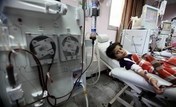
The Palestinian health ministry has warned that the dialysis machine service provided for kidney patients in its hospital might stop due to an acute shortage of spare filters and blood transfusion tubes.
Head of the ministry's pharmacy department in Gaza Munir al-Barsh stated in a press release on Monday that the ministry has insufficient dialysis machine filters and tubes, so it would be difficult for it to provide 544 kidney patients, including 22 children, with the service.
Barsh said that the ministry in Ramallah had been contacted several times since the beginning of the current year to urge it to provide its hospital in Gaza with the consumables needed for dialysis machines.
He appealed to health and human rights groups to work on providing the hospitals in Gaza with enough quantities of dialysis supplies in order to avoid an unprecedented health disaster threatening the lives of the kidney patients.
Head of the ministry's pharmacy department in Gaza Munir al-Barsh stated in a press release on Monday that the ministry has insufficient dialysis machine filters and tubes, so it would be difficult for it to provide 544 kidney patients, including 22 children, with the service.
Barsh said that the ministry in Ramallah had been contacted several times since the beginning of the current year to urge it to provide its hospital in Gaza with the consumables needed for dialysis machines.
He appealed to health and human rights groups to work on providing the hospitals in Gaza with enough quantities of dialysis supplies in order to avoid an unprecedented health disaster threatening the lives of the kidney patients.
